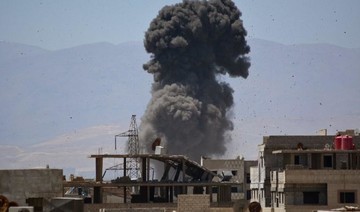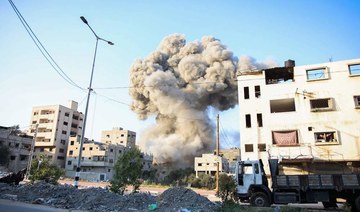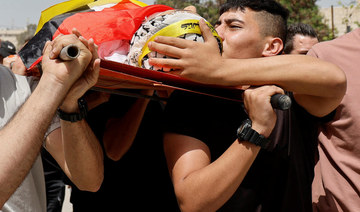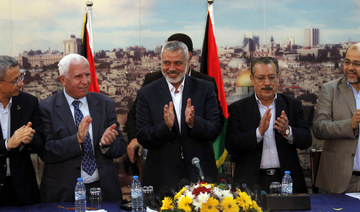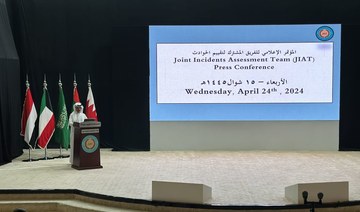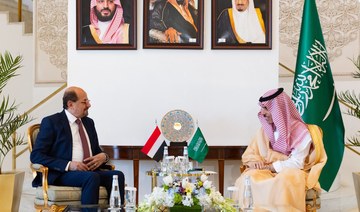TEL KEIF, Iraq: The entire trial lasted just over half an hour. A grey-haired man was led into the defendant’s booth. He fidgeted as the judge read the charges against him: Swearing allegiance to the Daesh group and working for the militants as an employee at a water station.
“Not guilty,” the defendant, Abdullah Al-Jabouri, told the judge in a session of one of Iraq’s counterterrorism courts this week. He said he had worked for Nineveh province’s water department for more than 20 years and stayed at his post when Daesh took over in 2014, but he denied ever swearing allegiance to the group.
“All government employees continued in their jobs at the water facility,” the 47-year-old Sunni Arab protested.
“I am asking you to speak only about yourself,” the judge interrupted him. Soon after, the judge and his two associates went into deliberations. A few minutes later they returned with their verdict: Guilty, sentenced to 15 years in prison. Al-Jabouri, his head bowed, was quickly led out and the next accused Daesh member was ushered in.
Iraq is holding huge numbers of detainees on suspicion of ties to the Daesh group — around 11,000, according to Iraqi officials — and they are being rushed through counterterrorism courts in trials that raise questions over whether justice is being done. At the same time, families are often left in the dark about where their loved ones are being detained or what their fates are.
The Associated Press last week attended several trials being held in Tel Keif, north of Mosul.
Throughout the system, the trials are usually short, often less than 30 minutes, and most end with guilty verdicts. Convictions are based on confessions that defendants and rights groups say intelligence agents extract by intimidation, torture and abuse. Also used as evidence are reports from anonymous informants, raising the possibility of false accusations made as revenge against rivals. The same defense lawyer works dozens of cases, with little knowledge of the defendants.
Moreover, even limited involvement with Daesh can bring harsh punishment. Under Iraq’s terror law, only three punishments are permitted — 15 years in prison, life imprisonment or execution by hanging. All verdicts are reviewed by Iraq’s Supreme Court.
“The system is built on an unjust foundation,” said one defense lawyer, Mahfoudh Hamad Ismael. “These suspects’ cases are done and finished the first day they enter a security detention center or an intelligence facility.”
The swift, truncated sessions reflect in part how Iraq’s judicial system has been overwhelmed by the influx of detained Daesh suspects. Rights groups have long criticized Iraqi courts, saying they struggle to uphold due process. Now they must work through thousands captured in broad sweeps carried out as Iraqi forces retook the northern city of Mosul last year.
Many Iraqis are also thirsty for quick retribution against a group that was notorious for its atrocities.
Prime Minister Haider Al-Abadi, who is running to retain his position in national elections next month, has repeatedly called for death sentences to be sped up. Since 2013, more than 3,000 people convicted on terror charges have been sentenced to death, according to a spreadsheet of Iraqi prison inmates analyzed by the AP. Since 2014, about 250 executions have been carried out. On April 16, the government announced it had executed 11 militants.
The heavy-handed, broad-brush crackdown in the courts threatens to further alienate Iraq’s Sunni Arab minority. Sunnis were the main community living under the Daesh group’s rule, both its recruiting base and its victims.
Some actively supported the group, joining its ranks as fighters or taking up significant positions in the government it created. But tens of thousands more worked with the group because they had no choice, either forced to cooperate or dependent on government jobs that now fell under the militants’ control.
During the AP’s visit Sunday to the Nineveh Criminal Court in Tel Keif, police officers hustled through the halls carrying armloads of case folders. A row of men awaiting trial crouched on the floor, facing the wall, hands cuffed.
Over the past year, the court has issued more than 815 verdicts on terrorism charges, said court spokesman Abdul Satar Bayraqdar. Of those, 112 were acquitted, 201 were sentenced to death, 150 to life in prison, and 341 to 15 years in prison. He said 1,715 detainees were released without trial. The most recent death sentence was issued April 19, to a man convicted of serving as a judge for the Daesh group, he said.
In one of the trials, the defendant, Salim Ahmed, stood in court with his hands cuffed behind his back, trembling.
The judge, Younus Al-Jumaily, read three documents. One was testimony from “secret informant number 130,” who said that Ahmed “showed sympathy and willingness to join the organization” and that he saw Ahmed carrying an assault rifle and working in the Daesh traffic police department. The judge also read a Kurdish intelligence report saying Ahmed confessed to joining Daesh, as well as a report from Iraqi intelligence saying he had sworn allegiance to the group.
“I swear to God, I swear to God, I swear to God, I am innocent,” Ahmed said. “I am a father of daughters. I did not give allegiance to the organization.” He said he worked in construction during Daesh rule.
He said he was forced to sign the confession without knowing what it said. “I was blindfolded all the time, I was under threat, and they forced me to put my fingerprint on these papers,” he said. He argued the secret informant’s testimony “could be written by anyone who hates me.”
The judges handed down a sentence of 15 years, noting that it was the lightest punishment. “He worked with Daesh traffic police. He didn’t fight for them,” Al-Jumaily said. The entire proceedings took just over 20 minutes.
The trial of Al-Jabouri, the water department employee, went similarly. The judge read out an intelligence report, an alleged confession and a report by the mayor of the village where Al-Jabouri worked. The mayor said Al-Jabouri’s family were known to be Daesh members and that Al-Jabouri worked in the water department under Daesh. But he said he never saw Al-Jabouri carry a gun or wear the militants’ distinct Afghan-style garb.
Al-Jabouri insisted on his innocence. He pointed out that Baghdad continued to pay his salary for months after the Daesh takeover — as the central government did for all public employees — and that he left the post several months later.
But the judge pressed Al-Jabouri, presenting the testimony in the documents again. “What do you say?“
“As you like,” Al-Jabouri replied, seemingly resigned that defense was futile.
“Look, it’s not ‘as I like’. What do you say about the accusations?” the judge retorted.
AL-Jabouri said his confession was “taken under fear and threat” and the reports by the mayor and intelligence chief were wrong.
After eight minutes of deliberations, the judges found him guilty and sentenced him to 15 years.
Meanwhile, the families of the thousands of Sunni Arabs in custody are largely in the dark about their loved ones’ fates. Most are never even told where their relatives are being detained and rely on word of mouth to gain information.
Two former detainees interviewed by AP reported harrowing conditions in Iraqi detention — from overcrowding and scabies outbreaks to improvised toilets made from plastic bags and water bottles.
Up the road from the courthouse in Tel Keif, a prison holds some 1,500 people, most waiting for trial.
An official showed The Associated Press five areas of the prison: a courtyard where women and their children were in the sunshine; a densely packed room for minors; two rooms of men, packed in shoulder to shoulder, all seated or crouching on the ground; and room where men who have been sentenced were eating lunch. At least one of the rooms had dark streaks and handprints on the walls that appeared to be excrement.
Outside the courtroom, one Iraqi woman came early, hoping for the chance to see her son, Kahtan, a 28-year-old doctor who was arrested in Mosul in the spring of 2017. She asked to be identified as Umm Kahtan, Arabic for Kahtan’s mother, for fear of reprisals by colleagues and neighbors.
She had been able to retain a lawyer, who had notified her about the trial session. After a sleepless night of prayer and reading the Qur’an, she arrived at the court at 7:30 a.m., ahead of its opening at 9 a.m. She brought a plastic bag of documents in her purse and two witnesses to attest to her son’s character.
She waited all day in the sun, refusing offers to sit, walking over to guards repeatedly to ask about her son’s case. Finally, at 2 p.m., the end of the work day, her lawyer walked out with a group of colleagues on the way to lunch. The case had been delayed, he told her.
Umm Kahtan rejoiced. At least today he would not be sentenced.
But she had hoped to finally see her son.
“They didn’t even allow me to go inside and just to have a look at him.”
Iraq’s Daesh trials bring swift verdicts, almost all guilty
Iraq’s Daesh trials bring swift verdicts, almost all guilty
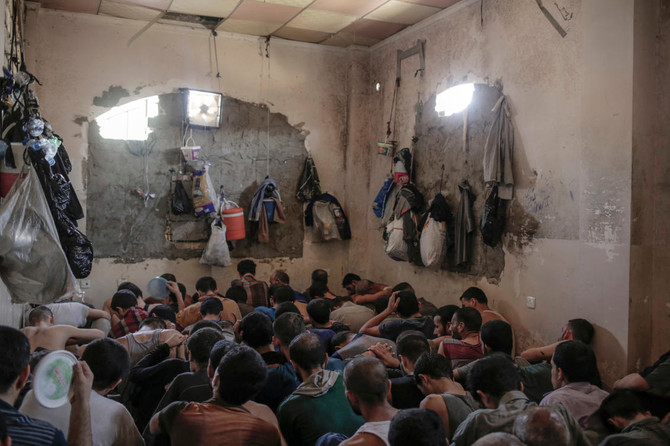
- Iraq is holding huge numbers of detainees - around 11,000 - on suspicion of ties to the Daesh group
- Throughout the system, the trials are usually short, often less than 30 minutes, and most end with guilty verdicts
Lebanon moves toward accepting ICC jurisdiction for war crimes on its soil
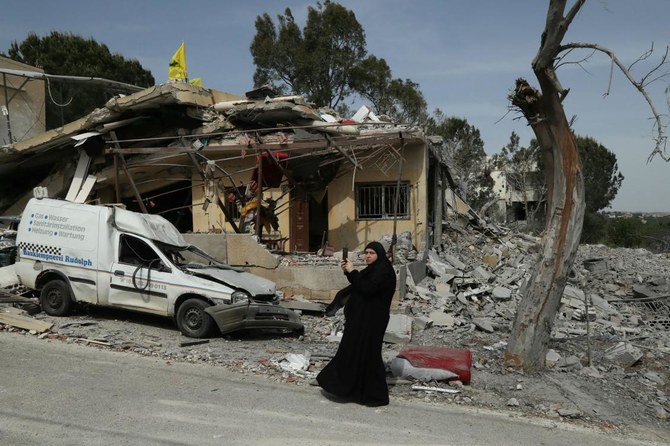
- Neither Lebanon nor Israel are members of the ICC
- Filing a declaration to the court would grant it jurisdiction to investigate and prosecute relevant crimes in a particular period
BEIRUT: Lebanon has moved toward accepting the International Criminal Court’s jurisdiction to prosecute violations on Lebanese territory since October, in what Human Rights Watch said on Saturday was a “landmark step” toward justice for war crimes.
Lebanon has accused Israel of repeatedly violating its sovereignty and committing breaches of international law over the last six months, during which the Israeli military and Lebanese armed group Hezbollah have traded fire across Lebanon’s southern border in parallel with the Gaza War.
That cross-border shelling has killed at least 70 civilians, including children, rescue workers and journalists, among them Reuters visuals reporter Issam Abdallah, who was killed by an Israeli tank on Oct. 13, a Reuters investigation found.
Lebanon’s caretaker cabinet voted on Friday to instruct the foreign affairs ministry to file a declaration with the ICC accepting the court’s jurisdiction to investigate and prosecute crimes committed on Lebanese territory since Oct. 7.
The decree also instructed the foreign ministry to include in its complaints about Israel to the United Nations a report prepared by the Netherlands Organization for Applied Scientific Research (TNO), an independent research institute.
That report looked specifically into Abdallah’s killing, and was produced by examining shrapnel, flak jackets, a camera, tripod and a large piece of metal that were gathered by Reuters from the scene, as well as video and audio material.
Neither Lebanon nor Israel are members of the ICC, which is based in The Hague. But filing a declaration to the court would grant it jurisdiction to investigate and prosecute relevant crimes in a particular period.
Ukraine has twice filed such declarations, which allowed for the court to investigate alleged Russian war crimes.
“The Lebanese government has taken a landmark step toward securing justice for war crimes in the country,” said Lama Fakih, Middle East and North Africa director at Human Rights Watch, urging the foreign minister to “swiftly” formalize the move by filing a declaration to the ICC.
“This is an important reminder to those who flout their obligations under the laws of war that they may find themselves in the dock,” Fakih said.
British troops may be tasked with delivering Gaza aid, BBC report says
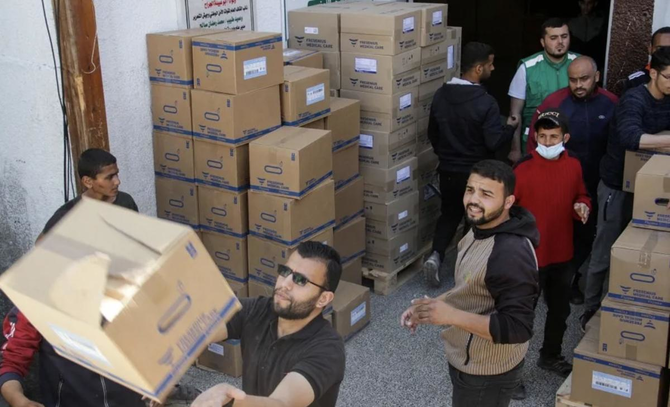
- Britain is already providing logistical support for construction of US pier, including a Royal Navy ship that will house hundreds of American soldiers
LONDON: British troops may be tasked with delivering aid to Gaza from an offshore pier now under construction by the US military, the BBC reported Saturday. UK government officials declined to comment on the report.
According to the BBC, the British government is considering deploying troops to drive the trucks that will carry aid from the pier along a floating causeway to the shore. No decision has been made and the proposal hasn’t yet reached Prime Minister Rishi Sunak, the BBC reported, citing unidentified government sources.
The report comes after a senior US military official said on Thursday that there would be no American “boots on the ground” and another nation would provide the personnel to drive the delivery trucks to the shore. The official, who spoke to reporters on condition of anonymity to discuss details not yet made public, declined to identify the third party.
Britain is already providing logistical support for construction of the pier, including a Royal Navy ship that will house hundreds of US soldiers and sailors working on the project.
In addition, British military planners have been embedded at US Central Command in Florida and in Cyprus, where aid will be screened before shipment to Gaza, for several weeks, the UK Ministry of Defense said on Friday.
The UK Hydrographic Office has also shared analysis of the Gaza shoreline with the US to aid in construction of the pier.
“It is critical we establish more routes for vital humanitarian aid to reach the people of Gaza, and the UK continues to take a leading role in the delivery of support in coordination with the US and our international allies and partners,” Defense Secretary Grant Shapps said in a statement.
Development of the port and pier in Gaza comes as Israel faces widespread international criticism over the slow trickle of aid into the Palestinian territory, where the United Nations says at least a quarter of the population sits on the brink of starvation.
The Israel-Hamas began with a Hamas-led attack into southern Israel on Oct. 7, in which militants killed around 1,200 people, mostly civilians, and took some 250 people as hostages. Israel says the militants are still holding around 100 hostages and the remains of more than 30 others. Since then, more than 34,000 Palestinians have been killed in Israel’s air and ground offensive, according to the Health Ministry in Hamas-run Gaza, around two-thirds of them children and women.
Israeli soldiers kill two Palestinian gunmen in West Bank, military says
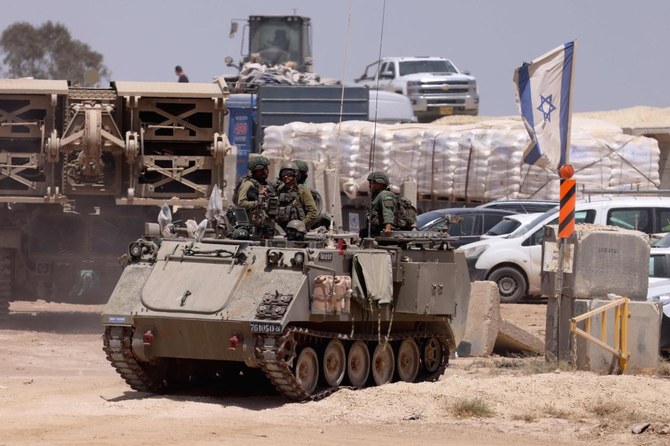
- Violence has been on the rise as Israel presses its attacks and bombardment in Gaza
RAMALLAH, West Bank: Israeli soldiers killed two Palestinian gunmen who opened fire at them from a vehicle in the occupied West Bank, the military said on Saturday.
The military released a photo of two automatic rifles that it said were used by several gunmen to shoot at the soldiers, at an outpost near the flashpoint Palestinian city of Jenin.
The official Palestinian news agency Wafa said security officials confirmed two deaths and the health ministry said two other men were wounded.
There was no other immediate comment from Palestinian officials in the West Bank, where violence has been on the rise as Israel presses its war against Palestinian militant group Hamas in Gaza.
Israel launched its offensive in Gaza after Hamas led an attack on southern Israel on Oct. 7 in which 1,200 people were killed and 253 taken hostage. More than 34,000 Palestinians have since been killed and most of the population displaced.
Violence in the West Bank, which had already been on the rise before the war, has since flared with stepped up Israeli raids and Palestinian street attacks.
The West Bank and Gaza, territories Israel captured in the 1967 war, are among the territories which the Palestinians seek for a state. US-brokered peace talks collapsed a decade ago.
Hamas says it received Israel’s response to its ceasefire proposal
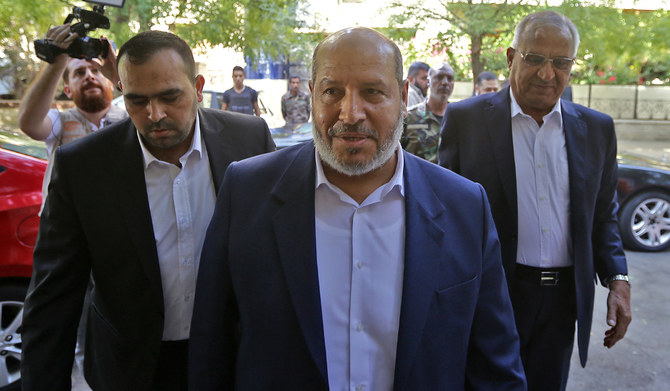
- White House national security adviser Jake Sullivan said on Friday he saw fresh momentum in talks to end the war and return the remaining hostages
- Israel has killed more than 34,000 Palestinians in Gaza, mostly women and children, according to the health ministry in the Hamas-run territory
CAIRO: Hamas said it had received on Saturday Israel’s official response to its latest ceasefire proposal and will study it before submitting its reply, the group’s deputy Gaza chief said in a statement.
“Hamas has received today the official response of the Zionist occupation to the proposal presented to the Egyptian and the Qatari mediators on April 13,” Khalil Al-Hayya, who is currently based in Qatar, said in a statement published by the group.
After more than six months of war with Israel in Gaza, the negotiations remain deadlocked, with Hamas sticking to its demands that any agreement must end the war.
An Egyptian delegation visited Israel for discussion with Israeli officials on Friday, looking for a way to restart talks to end the conflict and return remaining hostages taken when Hamas fighters stormed into Israeli towns on Oct. 7, an official briefed on the meetings said.
The official, who spoke on condition of anonymity, said Israel had no new proposals to make, although it was willing to consider a limited truce in which 33 hostages would be released by Hamas, instead of the 40 previously under discussion.
On Thursday, the United States and 17 other countries appealed to Hamas to release all of its hostages as a pathway to end the crisis.
Hamas has vowed not to relent to international pressure but in a statement it issued on Friday it said it was “open to any ideas or proposals that take into account the needs and rights of our people.”
However, it stuck to its key demands that Israel has rejected, and criticized the joint statement issued by the USand others for not calling for a permanent ceasefire and the withdrawal of Israeli forces from Gaza.
White House national security adviser Jake Sullivan said on Friday he saw fresh momentum in talks to end the war and return the remaining hostages.
Citing two Israeli officials, Axios reported that Israel told the Egyptian mediators on Friday that it was ready to give hostage negotiations “one last chance” to reach a deal with Hamas before moving forward with an invasion of Rafah, the last refuge for around a million Palestinians who fled Israeli forces further north in Gaza earlier in the war.
Meanwhile, in Rafah, Palestinian health officials said an Israeli air strike on a house killed at least five people and wounded others.
Hamas fighters stormed into Israeli towns on Oct. 7, killing 1,200 people and capturing 253 hostages. Israel has sworn to annihilate Hamas in an onslaught that has killed more than 34,000 Palestinians.
Yemen’s Houthis say their missile hit Andromeda Star oil ship in Red Sea
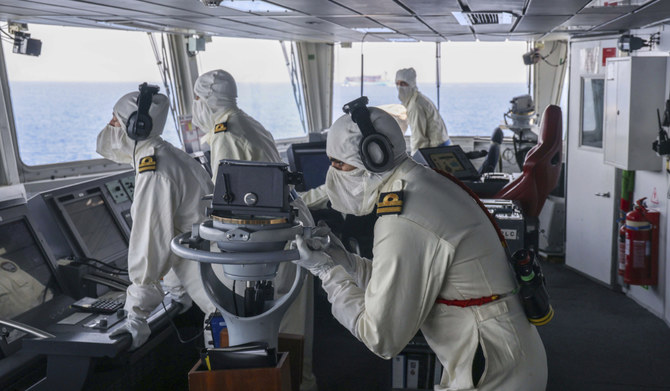
- US military confirmed that the Houthis launched three anti-ship ballistic missiles but caused minor damage to the ship
- A missile landed in the vicinity of a second vessel, the MV Maisha, but it was not damaged, US Centcom said on social media site X
CAIRO/LOS ANGELES: Yemen’s Houthis said on Saturday their missiles hit the Andromeda Star oil tanker in the Red Sea, as they continue attacking commercial ships in the area in a show of support for Palestinians fighting Israel in the Gaza war.
US Central Command confirmed that Iran-backed Houthis launched three anti-ship ballistic missiles into the Red Sea from Yemen causing minor damage to the Andromeda Star.
The ship’s master reported damage to the vessel, British maritime security firm Ambrey said.
A missile landed in the vicinity of a second vessel, the MV Maisha, but it was not damaged, US Central Command said on social media site X.
Houthi spokesman Yahya Sarea said the Panama-flagged Andromeda Star was British owned, but shipping data shows it was recently sold, according to LSEG data and Ambrey.
Its current owner is Seychelles-registered. The tanker is engaged in Russia-linked trade. It was en route from Primorsk, Russia, to Vadinar, India, Ambrey said.
Iran-aligned Houthi militants have launched repeated drone and missile strikes in the Red Sea, Bab Al-Mandab Strait and Gulf of Aden since November, forcing shippers to re-route cargo to longer and more expensive journeys around southern Africa and stoking fears the Israel-Hamas war could spread and destabilize the Middle East.
The attack on the Andromeda Star comes after a brief pause in the Houthis’ campaign that targets ships with ties to Israel, the United States and Britain.
The USS Dwight D. Eisenhower aircraft carrier sailed out of the Red Sea via the Suez Canal on Friday after assisting a US-led coalition to protect commercial shipping.
The Houthis on Friday said they downed an American MQ-9 drone in airspace of Yemen’s Saada province.



